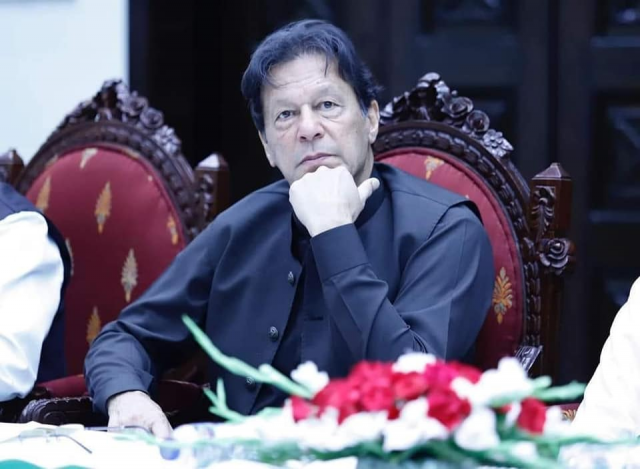Onus on institutions to ‘save’ country
Imran says to file SC plea on violence against workers

PTI Chairman and former premier Imran Khan on Saturday said it was the collective responsibility of the institutions as well as the entire nation to save the country from “destruction”.
“The country is heading towards destruction and it’s not only my responsibility, but of the institutions and the entire nation to stop this,” he said while addressing a news conference in Peshawar.
He added that those who had “installed thieves” in power would be held responsible for the losses incurred by the country.
The PTI chairman also said his party would approach the Supreme Court for its right to a peaceful protest.
Read more: No deal made, ended march to avoid bloodshed: Imran
“We will move the apex and high courts on the ‘violence’ inflicted on the PTI workers and supporters by the government during its Azadi March to Islamabad.”
The statement came days after former PM Imran took many by surprise when he suddenly announced ending his ‘Haqeeqi Azadi March’ and decided to give a six-day ultimatum to the ruling coalition to dissolve the assemblies and announce an election date or else he would return to the federal capital with more people next time.
Imran lashed out at the authorities for torturing and conducting raids against “peaceful” PTI activists during its long march, saying his party would file a petition in the Supreme Court against the government on Monday (May 30).
He added that he would approach the apex court against the government for creating hurdles in the way of the protesters and ask the top court whether or not staging “peaceful” protests were allowed in the country.
Besides approaching the SC, the PTI chairman said cases would also be registered against the police officials allegedly involved in dispersing the PTI marchers.
"We have to write down the names of police officers, register cases against them and will also share their names and faces on social media.”
Also read: PM unveils Rs28bn relief package
The PTI chairman also explained his decision to abruptly end the long march. “I did it because of the anger in our people,” he claimed.
He added that that he feared the anger would spill over into bloodshed and it was never his aim to enable violence and instability.
Imran maintained that the courts had always “favoured” the Sharif family in the cases against them. He said institutions were playing the role of spectators, while the coalition government led by the PML-N was busy in “destroying” the country.
The former premier said he was ready for negotiations with the government but only if his demand for early and transparent polls was accepted.
“My contention is that the more they [government] will remain in power, the further the country will move towards chaos.”
Criticising the government’s decision to increase the fuel prices, the former premier said the “imported government” was not purchasing Russian oil at a “discounted price” due to the fear of its “masters” (the US).
He claimed his government had inked an agreement with the Russian authorities to buy crude oil at a discounted price. “Despite being the strategic ally of the US, India reduced the oil prices because it is purchasing oil from Russia.”
The PTI chief said come what may, he would not accept the incumbent government and give another deadline for the next protest after his six-day ultimatum expired.
“I will sacrifice my life but will never accept them [government]. I am ready to fight till the end… we will come prepared this time.”
The former premier said he had directed his party members to go to their respective constituencies and start preparations for the next march to Islamabad.
Also read: What made Imran make a swift retreat?
He also announced challenging the recently amended accountability and election reforms bills in court, saying that depriving overseas Pakistanis of their basic right to vote was an injustice.
He also reiterated his allegations that a “foreign conspiracy” was hatched against his government for following an “independent foreign policy”.
Since his ouster through a no-confidence motion, Imran has been rallying across the country to build momentum against the government to force it to announce early elections, and the May 25 long march was supposed to stay put until a date was announced. However, that did not happen.
Nevertheless, one impact of the long march and the ultimatum was that Prime Minister Shehbaz Sharif said the doors were open for talks with the opposition but he would not take any dictation.
Speaking on the floor of the National Assembly last week, the premier even offered to form a committee to discuss the next elections.
Political observers said the budget and reforms were one thing, but the ruling alliance was also taking some time so that the impact of their decisions evaporated before they went to elections -- possibly in October.



















COMMENTS
Comments are moderated and generally will be posted if they are on-topic and not abusive.
For more information, please see our Comments FAQ